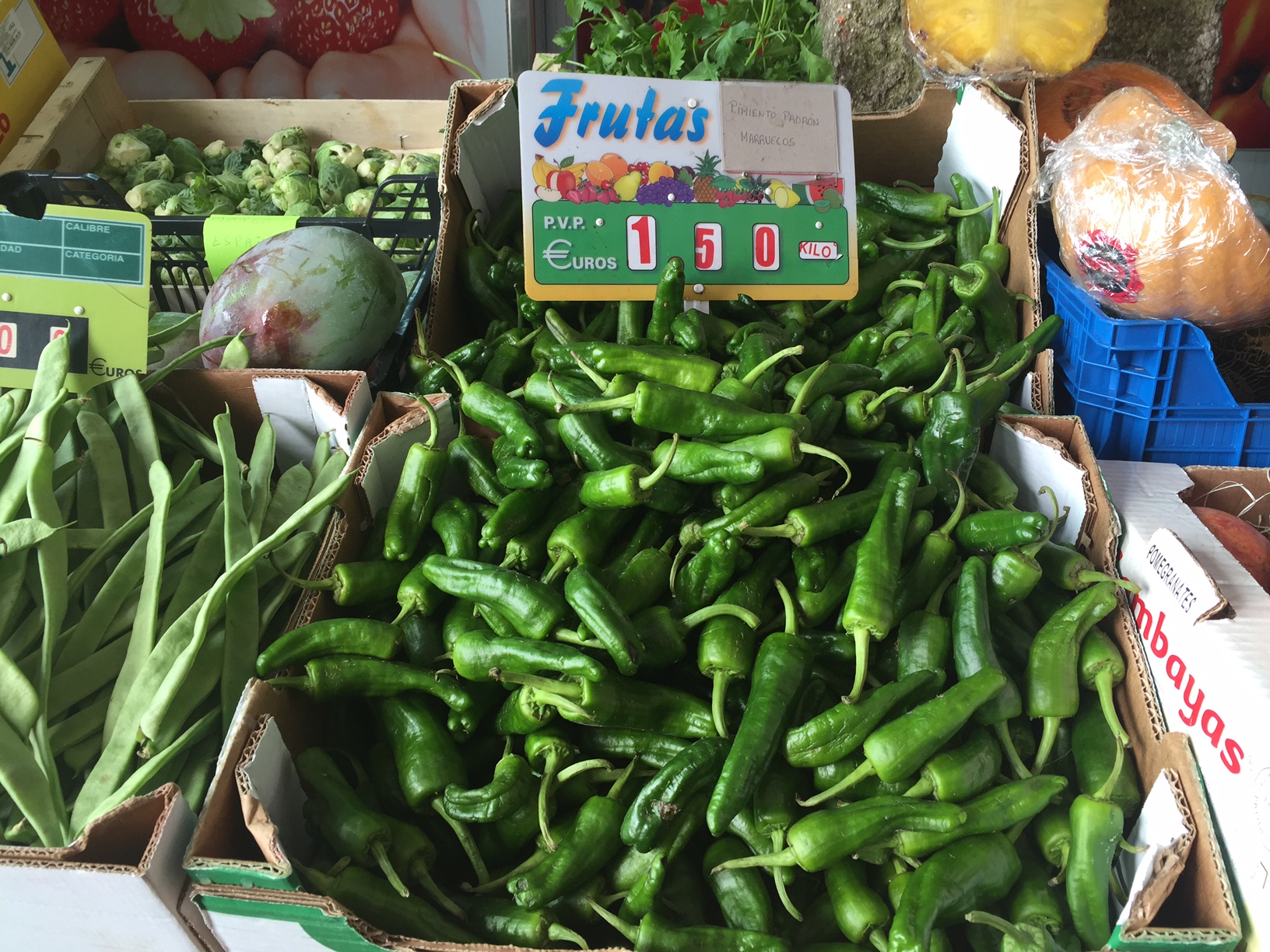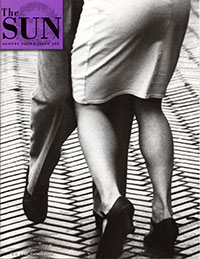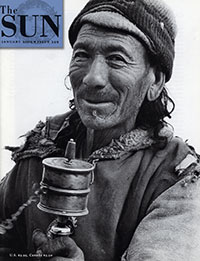Chögyam Trungpa was a renowned Tibetan Buddhist of the Shambhala tradition, which believes, he wrote, “that in this world, as it is, we can find a good and meaningful human life that will also serve others.” In one of his first books, Shambhala: The Sacred Path of the Warrior, he writes of how the essence of fearlessness is not in denying that fear exists but in going beyond fear.
Sauteed Pimiento de Padron Peppers
Pimientos de padrón originate in Northwest (Galicia) Spain, but I first tasted them in Southwest France. It was 2012, and I was spending my second summer in France along the Mediterranean and not far from the Spanish border. It is a region known as Catalonia. Officially an autonomous community in Spain, with its capital city Barcelona, Catalonia once included Spain and France. On the French side, the region today is called Roussillon, corresponding roughly to the present-day southern French department of Pyrenees-Orientales (Eastern Pyrenees).
Men Are From Earth, And So Are Women
“Men Are From Earth, And So Are Women: Marion Woodman On The Inner Marriage Of The True Masculine And The True Feminine,” Originally published in The Sun magazine, August 2006
Download a PDF of this interview
I’d never danced in church before I took a workshop with Marion Woodman. Being in the chapel of New York City’s Union Theological Seminary was a sort of homecoming for me: five years earlier I had stridden down the middle aisle of that chapel with a newly minted master of divinity degree in my hand. Now a series of seemingly disconnected incidents had brought me back, as if by design, to attend Woodman’s workshop. The psychologist Carl Jung might have chalked it all up to “synchronicity” — a meaningful link between otherwise unrelated events. Woodman, a Jungian analyst herself, would no doubt agree.
Be Not Silent
“Be Not Silent: Sister Joan Chittister Speaks Out On War, Feminism, And The Catholic Church,” Originally published in the June 2007 issue of The Sun magazine.
Download a PDF of this interview
When Bill Moyers interviewed Sister Joan Chittister on his PBS news program NOW, he began by saying, “It’s always surprising to me to discover that nuns look like you.” Chittister chuckled and replied, “Well, what does a nun look like?” She doesn’t behave according to the common, mostly unflattering image of nuns: part demure acolytes prostrating themselves at the altar rail, part embittered schoolmarms smacking mischievous students’ knuckles with wooden rulers. Chittister is demure in neither stature nor stride, and if she harbors any bitterness, it seems she has alchemically transmuted it into an untiring advocacy for the common good.
Sitting In The Fire
“Sitting In The Fire: Pema Chodron On Turning Toward Pain” by James Kullander published in the The Sun magazine in January 2005.
Download a PDF of this interview
I first met Pema Chödrön at Zen Mountain Monastery, a remote retreat center in the Catskill foothills of upstate New York. She was leading a retreat, and I was in the midst of a divorce. As is often the case with people going through a divorce, I was looking for answers to questions I hadn’t even known I had.
Here & There November 2009
Up until about 10 years ago, I attended a Society of Friends meeting almost every Sunday morning. At the time, I lived in a small rented cabin only a few miles from the meeting room, which many years before had been a one-room schoolhouse alongside a country road. It was a small gathering, about a dozen of us, from many walks of life—farmers, weekenders from New York City, social workers, writers. Raised a Protestant, I was then beginning to explore Buddhist meditation and I liked the shared tradition of sitting in silence as practiced by both Buddhists and Quakers. One friend described a Quaker meeting room as a “zendo with pews.”
What happens in a Quaker meeting, unlike in a Buddhist meditation hall, is if you feel moved to speak—if a message rises in you—you speak. And the others listen. The meetings last an hour. Within that hour, sometimes no one says a word. You just listen to the glorious silence all around you. Other times a lot of people have something to say. Either way, I found that the experience enriched my life. I was moved by the depth of what people said, the way they struggled in their search to live with compassion and understanding. In addition to working at Omega, I was a seminary student at the time. I found at the Quaker meetings a meaningful way to tap into the spiritual and personal transformational experiences I was helping Omega offer and studying in the books I was assigned to read.
In 1999, I moved several miles away from the meeting room when I bought a house. Not only did the miles get between me and the Quaker meeting room; the house did, too. It required work—lawn mowing, painting, cleaning, small repairs—that took up my Sunday mornings. I stopped attending the meetings pretty much altogether. And this is when I experienced an even greater appreciation of the Quaker tradition, or at least of the group I’d found myself with.
As the weeks, months, and years rolled by, I was kept on the mailing list, I was phoned when people I knew at the meeting were hospitalized or died, and I was sent invitations to special events. This past year, I was invited to participate in a series of small dinner parties hosted by individual members at their homes. All during this time—and even at the dinner parties I attended—no one chided or scolded me for not showing up at the meetings. I was missed, but never made to feel guilty or that I would somehow suffer in my afterlife for being a backslider.
I began to see these people as friends in the deepest sense—they accept people for who they are and the lives they lead. It’s good that we have people who, when we are young or going down some dangerous path, nudge or question us. But when it comes to the spiritual journey among functioning adults, more often than not we need to find our own way.
Early in my exploration of Buddhism, I went to a number of different retreat centers where I experienced Zen Buddhism, Theravadin Buddhism (Insight Meditation), and Tibetan Buddhism. One of my first retreats was in 1994 at a Zen retreat center. It was a small place and the only accommodations were dorm rooms. I was in a room with 10 other men, eight of whom—guessing from what I could count in the dark—snored through the night. I do not snore and I did not sleep a wink. The next day during a break between the many meditation sessions, I told a resident monk I needed to “sit the next one out” and take a nap. He turned sharply toward me and snapped, “That is not an option. We are all in this together.” If I wanted to “sit this one out” then I had to leave. So I went to the meditation session, delirious to the point of passing out. I have not been back to that place since.
Later, I found myself at retreat centers where the meditation sessions and teachings were presented as a gift to be enjoyed, not a form of punishment to be endured. And you partook of the gift as you were able. Nobody was taking attendance, no one was making you leave if you didn’t show up. I’ve since found myself going to these kinds of centers a lot while staying connected to my Quaker friends to the degree that my time and energy allow.
I am finding that I am most grateful for the things, people, and experiences that show up in my life, sometimes out the blue, that reveal to me more of who I really am and what I have to give to the world. Work and family demands on our lives are stressful enough without having to follow an individual’s, a group’s, or an institution’s demands on how we manage the manifestation of our deepest, truest self. That passage comes from individual revelation, which speaks to each of us through the beating of our heart. We are each Jesus in the garden of Gethsemane, we are each Buddha at the palace door. If we are paying attention, our lives are called into question and called to a higher cause that has nothing to do with being forced to sit in a meditation hall, barely conscious and nauseous, simply because those are the rules.
To me, when it comes to spiritual awakening, there are no rules and little conscious design, and to be told what to do in such circumstances is absurd, if not damaging. It is a violation of our deepest, individual, divine will. We turn down a path for apparently no reason, find a book that seems to have fallen off the shelf and into our hands, meet people in a seemingly random chain of events who subsequently and permanently transform our lives. And who’s to say when and how that will happen? We may blunder, find ourselves puzzled by our own actions, and even wind up troubled by a bad conscience—all of which offer unique and powerful opportunities for self-discovery and spiritual growth, and thus a healthier and more beautiful and meaningful life.
What’s more valuable to our awakening, a solitary walk among the autumn leaves or being told you have to sit in a meditation hall because “we’re all in this together”? The answer is that neither is more valuable than the other. What matters is what you feel you need to do—sit or walk—at any given moment according to the still, small voice within. And when we allow others in our life this free rein, we are giving them our unconditional love.
I recently pulled from my bookshelf M. Scott Peck’s classic 1978 book The Road Less Traveled. I found I’d earmarked dozens of pages and underlined dozens of passages when I read the book in the mid-1980s. One passage I underlined in red pencil reads, “Genuine love not only respects the individuality of the other but actually seeks to cultivate it, even at the risk of separation or loss. The ultimate goal of life remains the spiritual growth of the individual, the solitary journey, to peaks that can be climbed only alone.”
We are “all in this together” only if we’re left alone to pursue what we feel is best and right for us during our encounters with the sometimes irrational and numinous factors of the psyche. And in our individual independence, we connect with others at a soul level, like people gathering round a well, and everyone knows exactly what you are going through, have been through, and, quite possibly, will go through. And these people are your friends.



